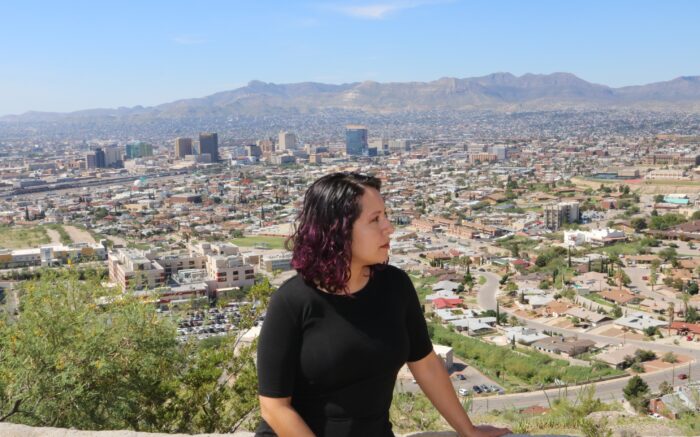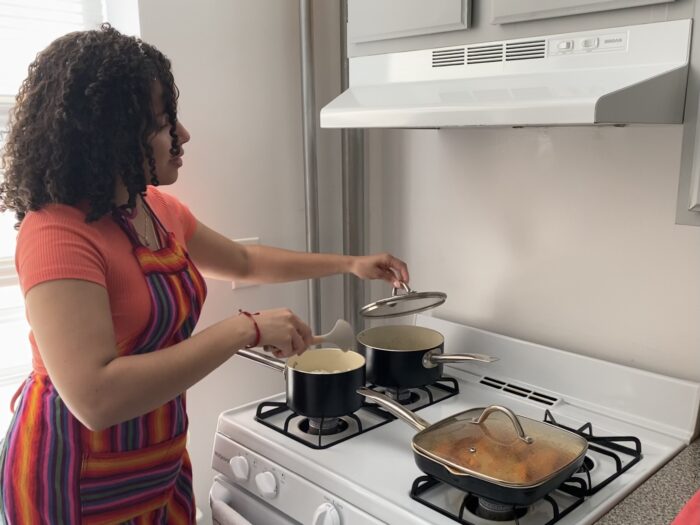Everyone around the globe has been affected by the pandemic, but Latinas in particular have been devastated by it, suffering high rates of illness, job loss, and extraordinary parenting pressures. One in four Latinas has lost a family member due to Covid.
Catalyst staff members Corin Ramos, PhD, and Tahiana Abad share their reflections on being rooted in their culture during this challenging time—and how these connections buoy them during times of crisis.
Living With Systematic Racism in a Border Community

In El Paso, Texas, everyone is greeted with a warmth that is not easily forgotten. First, by the hot, dry desert sun, and then by the incredibly friendly and kind-hearted people. Those of us living in border communities know who our people are and what we look like. In El Paso, we are familial, hardworking, and Brown. El Paso is over 80% Latinx. Most of the community are Mexican American, with a large portion of Mexican nationals who split their time between the city and Juarez, Mexico, just over the Rio Grande. These community characteristics made for a devastating pandemic.
About 20% of El Paso’s population has contracted Covid-19 so far. Prior to the vaccine, we were all vulnerable and many people got sick. Our hospitals crashed, and it was devastating. Our funeral homes and morgues were full, and the community was not receiving the support we badly needed. Desperate for help, the county enlisted inmates to move bodies and recruited temporary morgue staff to assist with the overflow of victims. Only then did El Paso receive much-needed help from the National Guard. It reminded me of the massively inadequate response to Hurricane Katrina in 2005, which so dramatically highlighted how our government treats communities of color.
The Covid-19 pandemic has made me feel that my government doesn’t care about me or other Brown people. It’s a very helpless feeling when your community is suffering and dying, and everyone knows it, but help doesn’t come. As a Latina living in a border community during Covid-19, I felt othered, and I felt people in power didn’t care.
As a person of color, I have always been aware that there are ignorant, racist individuals in the world. What still catches me by surprise is the systematic nature of racial bias. I will never forget the unique feeling of powerlessness that came with seeing my community and my ethnicity ignored by multiple levels of government. – Corin Ramos
Reconnecting With My Culture Through Cooking

All the time I spent in isolation during the Covid-19 pandemic made me realize just how dearly I missed being connected to my Dominican culture. Before the pandemic, my life was always on “go,” and I knew this was something I needed to change because I started noticing that I was becoming more actively present in my professional career than in my own culture.
I no longer wanted this to be my reality, and I decided to reconnect with my culture through cooking.
I remember the wholesome appreciation I felt when I cooked my first homemade meal of arroz blanco, pollo guisado, habichelas negra, y aguacate (white rice, stewed chicken, black beans, and avocado). I do not know if it was Marc Anthony’s song Vivir Mi Vida or the flavorful aroma of the sazón spices hugging my kitchen walls, but at that given moment, I felt more in sync with my cultural roots than I ever felt before the pandemic. The arroz blanco, pollo guisado, y habichuelas negra reminded me of my abuelita’s favorite comfort food she would cook for my brother and me, and the aguacate reminded me of my abuelito’s aguacate tree in our home in the Dominican Republic that I grew up with. With time, I noticed that with every meal I made, I felt more united to my roots and found comfort during a nationwide time of distress and isolation.
Being able to work from home offered the space I needed to be able to reconnect with my roots. Remote working gave me the opportunity to feel more attached to my family, despite the physical distance between us. Cooking introduced a new perspective to my life. A perspective that brought comfort, appreciation, and attention to the core of who I am: mi cultura Dominicana. –Tahiana Abad
Corin Ramos, PhD, worked in collaboration with the Research team at Catalyst. Corin was committed to helping leaders understand how cultural, racial, and ethnic differences, as well as racially charged current events, can impact employees of color. Prior to working at Catalyst, Corin worked in higher education at two Hispanic-Serving Institutions. She has experience in institutional research, program evaluation, and diversity and inclusion programs within a community college and university setting. Corin is a first-generation college graduate. She earned her undergraduate degree in Psychology at California State University, Sacramento. She attended graduate school at The University of Texas at El Paso where she earned an MA in Experimental Psychology and a PhD in Social Psychology.